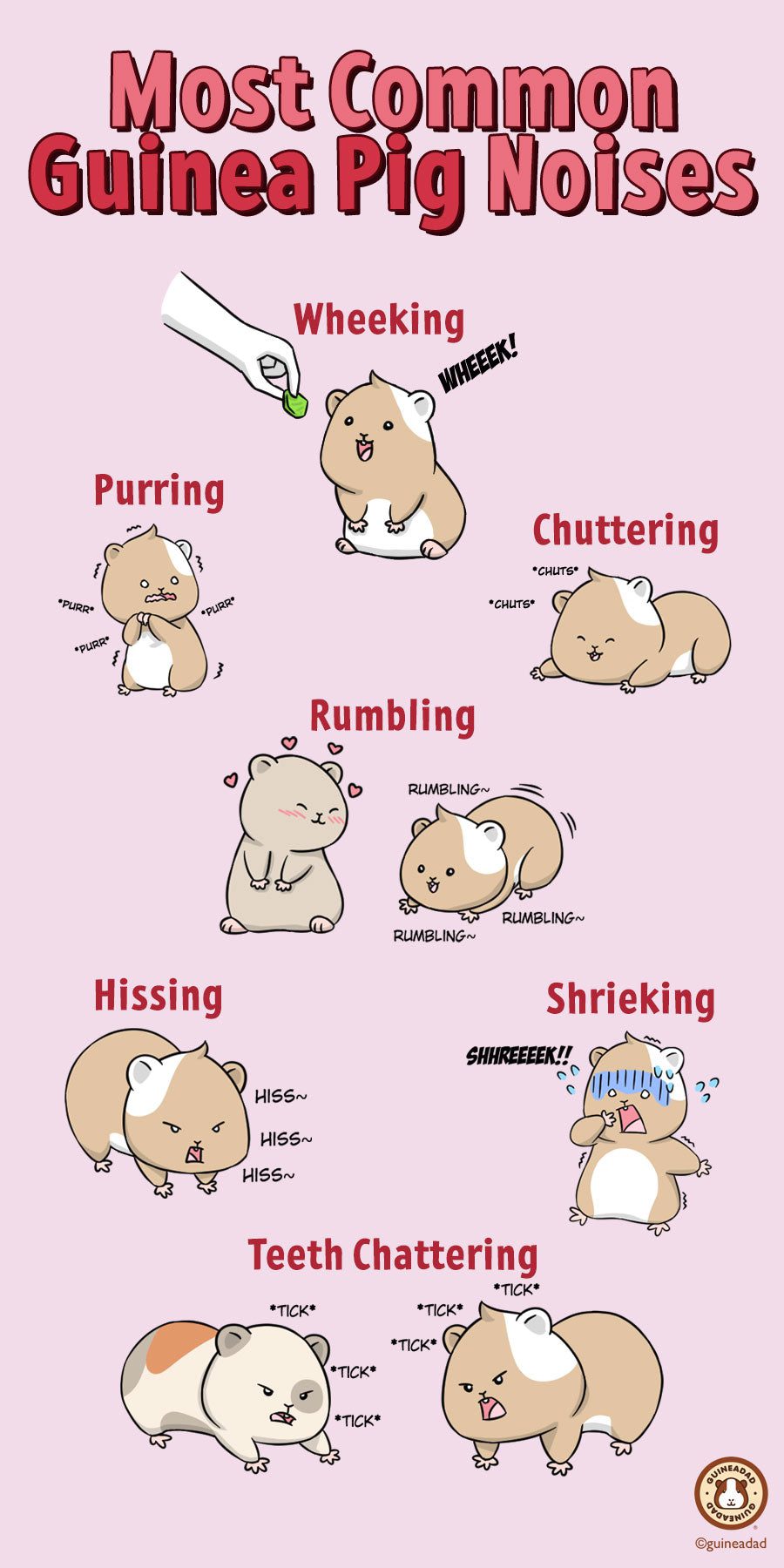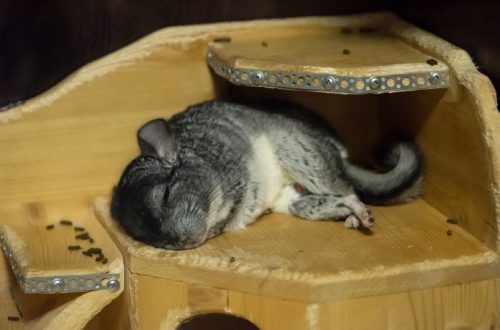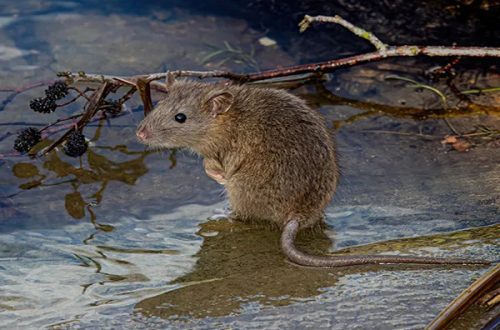
Guinea pig sounds and their meaning
Guinea pigs are highly social animals that exhibit a wide range of behavioral patterns. These small animals only seem to be quiet and inconspicuous, but just try not to feed this “quiet” creature on time, and you will immediately hear who is the boss in the house and where the crayfish spend the winter!
Guinea pigs are active, inquisitive and very talkative animals. Each sound made by pigs has its own meaning, so if you know the meaning of all the “drink-drink” and “wee-wee” of your pig, it will help you better understand your little friend.
Guinea pigs are highly social animals that exhibit a wide range of behavioral patterns. These small animals only seem to be quiet and inconspicuous, but just try not to feed this “quiet” creature on time, and you will immediately hear who is the boss in the house and where the crayfish spend the winter!
Guinea pigs are active, inquisitive and very talkative animals. Each sound made by pigs has its own meaning, so if you know the meaning of all the “drink-drink” and “wee-wee” of your pig, it will help you better understand your little friend.
You will be able to tell when your pet is happy, sad, excited or scared.
The sounds of guinea pigs cannot always be interpreted with 100% accuracy, as each pig has individual characteristics. For example, some guinea pigs may show happiness by purring, while purring in other guinea pigs may indicate anger or displeasure.
Generally speaking, it is much easier to classify guinea pig sounds into two categories − positive sounds and negative, disturbing sounds. The most common sounds in both categories are listed below. We hope these examples will help you understand the “pig” language. Well, or at least comprehend the basics of colloquial swine speech.
You will be able to tell when your pet is happy, sad, excited or scared.
The sounds of guinea pigs cannot always be interpreted with 100% accuracy, as each pig has individual characteristics. For example, some guinea pigs may show happiness by purring, while purring in other guinea pigs may indicate anger or displeasure.
Generally speaking, it is much easier to classify guinea pig sounds into two categories − positive sounds and negative, disturbing sounds. The most common sounds in both categories are listed below. We hope these examples will help you understand the “pig” language. Well, or at least comprehend the basics of colloquial swine speech.
Contents
Positive guinea pig sounds
Kurlykanye
A low, soft chirp usually indicates that the pig is well and happy. Such sounds can most often be heard when the pig is basking in your arms or you stroke it. This sound indicates that the pig is well in your arms.
Kurlykanye
A low, soft chirp usually indicates that the pig is well and happy. Such sounds can most often be heard when the pig is basking in your arms or you stroke it. This sound indicates that the pig is well in your arms.
May be accompanied by slightly noticeable chewing movements. If the pigs purr at each other in this way, accompanying the rumbling with swaying movements or a nose-to-nose stand, this usually means a conversation with finding out who will occupy the house, get the female pig, who the owner will take on the handles or which of them is more important.
This is how a happy and contented guinea pig “sounds”
May be accompanied by slightly noticeable chewing movements. If the pigs purr at each other in this way, accompanying the rumbling with swaying movements or a nose-to-nose stand, this usually means a conversation with finding out who will occupy the house, get the female pig, who the owner will take on the handles or which of them is more important.
This is how a happy and contented guinea pig “sounds”
Sometimes a similar sound can mean fear. Especially if the sounds are short and jerky, and the mumps froze in a motionless, tense pose.
Povizgivanie
This is a high-pitched shrill sound used by guinea pigs, especially when communicating with us humans. Voiced squeals in guinea pigs most often symbolize anticipation and excitement. Most often, pigs attract the attention of the owner with such loud sounds. Like, “Feed already!”
Sometimes a similar sound can mean fear. Especially if the sounds are short and jerky, and the mumps froze in a motionless, tense pose.
Povizgivanie
This is a high-pitched shrill sound used by guinea pigs, especially when communicating with us humans. Voiced squeals in guinea pigs most often symbolize anticipation and excitement. Most often, pigs attract the attention of the owner with such loud sounds. Like, “Feed already!”
In case you feed your guinea pig at certain times of the day (which is basically what you should be doing), the little guinea pig will get more and more agitated closer to feeding time and may even try to get your attention ( did you forget about lunch?).
Guinea pigs are fast-witted, and if you respond to such a call once, be prepared to hear this sound regularly. Conditioned reflex in action.
In case you feed your guinea pig at certain times of the day (which is basically what you should be doing), the little guinea pig will get more and more agitated closer to feeding time and may even try to get your attention ( did you forget about lunch?).
Guinea pigs are fast-witted, and if you respond to such a call once, be prepared to hear this sound regularly. Conditioned reflex in action.
cooing
A gurgle-like sound like a series of short, sharp, fast sounds indicates that your guinea pig is happy and in a blissful state. The same sound is made by females accepting the courtship of a male.
cooing
A gurgle-like sound like a series of short, sharp, fast sounds indicates that your guinea pig is happy and in a blissful state. The same sound is made by females accepting the courtship of a male.
Such cooing is also often associated with physical activity, exploring new places, or playing. The main thing is that at these moments the pig is good.
At first glance, there is not much difference between these two sounds, but the experienced ear of a sensitive owner will pick up a slight difference.
Such cooing is also often associated with physical activity, exploring new places, or playing. The main thing is that at these moments the pig is good.
At first glance, there is not much difference between these two sounds, but the experienced ear of a sensitive owner will pick up a slight difference.
Anxious sounds of guinea pigs
To express anxiety, excitement and discontent, guinea pigs also have a set of peculiar sounds. Such sounds should alert the attentive owner. It would be good to find out the cause of anxiety or dissatisfaction as soon as possible in order to quickly reduce discomfort or eliminate the threat.
Discontent
Most often, pigs express their dissatisfaction with the help of a kind of gnashing of teeth. If you hear such a sound, this is the first sign that the pig does not like something or is excited. Anything can be the reason: a showdown with relatives, a new person, an unfamiliar environment, sharp loud sounds, etc.
Knocking and clicking teeth indicate that the pig is angry and ready for a possible attack (occurs when two males meet). You can also hear this sound when the pig is scared. Usually such a sound is addressed to another pig, but sometimes a person can hear it addressed to himself (“I don’t want to take any more drugs!” ;))
To express anxiety, excitement and discontent, guinea pigs also have a set of peculiar sounds. Such sounds should alert the attentive owner. It would be good to find out the cause of anxiety or dissatisfaction as soon as possible in order to quickly reduce discomfort or eliminate the threat.
Discontent
Most often, pigs express their dissatisfaction with the help of a kind of gnashing of teeth. If you hear such a sound, this is the first sign that the pig does not like something or is excited. Anything can be the reason: a showdown with relatives, a new person, an unfamiliar environment, sharp loud sounds, etc.
Knocking and clicking teeth indicate that the pig is angry and ready for a possible attack (occurs when two males meet). You can also hear this sound when the pig is scared. Usually such a sound is addressed to another pig, but sometimes a person can hear it addressed to himself (“I don’t want to take any more drugs!” ;))
If two guinea pigs meet for the first time, such a sound may be a sign of dominance.
Please remember this sound to be on your guard in case of emergency. If two guinea pigs are chattering their teeth against each other, this is a signal that there is a problem, and separation or temporary resettlement will be the best way out.
Most often, such “showdowns” occur when the pigs cannot share the territory, the feeder or one cucumber for two. Or when they add a new friend.
Approximately in this way, males find out who is in charge in the family:
If two guinea pigs meet for the first time, such a sound may be a sign of dominance.
Please remember this sound to be on your guard in case of emergency. If two guinea pigs are chattering their teeth against each other, this is a signal that there is a problem, and separation or temporary resettlement will be the best way out.
Most often, such “showdowns” occur when the pigs cannot share the territory, the feeder or one cucumber for two. Or when they add a new friend.
Approximately in this way, males find out who is in charge in the family:
If the pig knocks its teeth on a newly arrived relative, then most likely you will also notice a slightly reared coat in the neck area. Thus, the pig tries to look larger and take a dominant position. Sometimes the pigs still sway slightly from side to side.
If two pigs do not get along well with each other and constantly chatter their teeth, it is better to resettle them. The adjustment period will be longer but more comfortable and less stressful if the gilts’ contacts are short and punctuated by intervals of solitude during which both guinea pigs can rest and calm down to eventually become roommates and good friends.
For information on how to painlessly add new pigs to relatives, read the article “Adjustment Period”
If the pig knocks its teeth on a newly arrived relative, then most likely you will also notice a slightly reared coat in the neck area. Thus, the pig tries to look larger and take a dominant position. Sometimes the pigs still sway slightly from side to side.
If two pigs do not get along well with each other and constantly chatter their teeth, it is better to resettle them. The adjustment period will be longer but more comfortable and less stressful if the gilts’ contacts are short and punctuated by intervals of solitude during which both guinea pigs can rest and calm down to eventually become roommates and good friends.
For information on how to painlessly add new pigs to relatives, read the article “Adjustment Period”
Growl
If you hear your guinea pig making a “drrr-drrr” sound, it’s most likely a harmless and peaceful fur ball growling! This sound will be different from the usual dog growl, pigs growl in their own way. But in any case, the sound is disturbing.
Growling is a clear sign that the pig is feeling threatened or afraid. The first thing to do with such a sound is to eliminate any danger that may be nearby. It can be other pets, children, new people, etc.
Growl
If you hear your guinea pig making a “drrr-drrr” sound, it’s most likely a harmless and peaceful fur ball growling! This sound will be different from the usual dog growl, pigs growl in their own way. But in any case, the sound is disturbing.
Growling is a clear sign that the pig is feeling threatened or afraid. The first thing to do with such a sound is to eliminate any danger that may be nearby. It can be other pets, children, new people, etc.
The next task is to soothe and gently stroke your frightened guinea pig to calm her down. Just do it carefully, as a stressed guinea pig who is scared, agitated and growling feels the need to defend himself and may inadvertently trip your toe (although guinea pigs rarely bite).
The next task is to soothe and gently stroke your frightened guinea pig to calm her down. Just do it carefully, as a stressed guinea pig who is scared, agitated and growling feels the need to defend himself and may inadvertently trip your toe (although guinea pigs rarely bite).
Squealing
In most cases, squealing is a sign that the guinea pig is experiencing some kind of discomfort – hunger, loneliness, pain. Most often, after a hearty dinner, squeals stop.
Squealing
In most cases, squealing is a sign that the guinea pig is experiencing some kind of discomfort – hunger, loneliness, pain. Most often, after a hearty dinner, squeals stop.
If the pig has food, hay and water in abundance, and she continues to make such sounds, the reason may be loneliness. Especially if the pig lives alone.
If the pig has food, hay and water in abundance, and she continues to make such sounds, the reason may be loneliness. Especially if the pig lives alone.
Loud insistent squeals are the call “Pay no attention to me!”. Maybe the pig wants to chat with you, she is bored and lonely.
If these sounds do not stop for a long time, it may be worthwhile to consult a veterinarian. Maybe this is a signal that you are not feeling well, and there are some health problems that are not visible to the naked eye.
Loud insistent squeals are the call “Pay no attention to me!”. Maybe the pig wants to chat with you, she is bored and lonely.
If these sounds do not stop for a long time, it may be worthwhile to consult a veterinarian. Maybe this is a signal that you are not feeling well, and there are some health problems that are not visible to the naked eye.
A screech is not a very pleasant sound to the ear. Ideally, the less the guinea pig squeals, the better!
A screech is not a very pleasant sound to the ear. Ideally, the less the guinea pig squeals, the better!
The “chirping” of guinea pigs
This is the most unusual and mysterious sound of guinea pigs, which has not yet been found an unambiguous explanation. Not many breeders will be lucky enough to hear with their own ears the “chirping” of their pig, pigs rarely “chirp” and not all.
But when you hear this sound, you will be amazed at how similar it is to birdsong. Just listen to the sound below!
No one knows for sure why guinea pigs chirp. Some say that at this moment the pig seems to be in a state of trance, others argue that, on the contrary, in this way the pet shows its excitement. And still others claim that this is how the pigs “sing” after the loss of their relative.
Be that as it may, there is still no clear and intelligible explanation.
This is the most unusual and mysterious sound of guinea pigs, which has not yet been found an unambiguous explanation. Not many breeders will be lucky enough to hear with their own ears the “chirping” of their pig, pigs rarely “chirp” and not all.
But when you hear this sound, you will be amazed at how similar it is to birdsong. Just listen to the sound below!
No one knows for sure why guinea pigs chirp. Some say that at this moment the pig seems to be in a state of trance, others argue that, on the contrary, in this way the pet shows its excitement. And still others claim that this is how the pigs “sing” after the loss of their relative.
Be that as it may, there is still no clear and intelligible explanation.
And another interesting fact – other guinea pigs that hear “chirping” begin to behave … strange. In this case, experienced breeders advise isolating the vociferous “Pavarotti” from the general enclosure until he finishes singing!
Either way, it’s quite an interesting sight!
And another interesting fact – other guinea pigs that hear “chirping” begin to behave … strange. In this case, experienced breeders advise isolating the vociferous “Pavarotti” from the general enclosure until he finishes singing!
Either way, it’s quite an interesting sight!





